Translation and analysis of words by ChatGPT artificial intelligence
On this page you can get a detailed analysis of a word or phrase, produced by the best artificial intelligence technology to date:
- how the word is used
- frequency of use
- it is used more often in oral or written speech
- word translation options
- usage examples (several phrases with translation)
- etymology
object transformation - translation to russian
математика
преобразование объекта
математика
непрерывное преобразование
математика
дискретное преобразование
Definition
во 2 ·знач.; физ., тех.).
в 3 ·знач.; театр.). Приемы трансформации.
Wikipedia
In molecular biology and genetics, transformation is the genetic alteration of a cell resulting from the direct uptake and incorporation of exogenous genetic material from its surroundings through the cell membrane(s). For transformation to take place, the recipient bacterium must be in a state of competence, which might occur in nature as a time-limited response to environmental conditions such as starvation and cell density, and may also be induced in a laboratory.
Transformation is one of three processes that lead to horizontal gene transfer, in which exogenous genetic material passes from one bacterium to another, the other two being conjugation (transfer of genetic material between two bacterial cells in direct contact) and transduction (injection of foreign DNA by a bacteriophage virus into the host bacterium). In transformation, the genetic material passes through the intervening medium, and uptake is completely dependent on the recipient bacterium.
As of 2014 about 80 species of bacteria were known to be capable of transformation, about evenly divided between Gram-positive and Gram-negative bacteria; the number might be an overestimate since several of the reports are supported by single papers.
"Transformation" may also be used to describe the insertion of new genetic material into nonbacterial cells, including animal and plant cells; however, because "transformation" has a special meaning in relation to animal cells, indicating progression to a cancerous state, the process is usually called "transfection".


![[[Isometry]] [[Isometry]]](https://commons.wikimedia.org/wiki/Special:FilePath/France par rotation 180deg.gif ?width=200)
![Similarity]] Similarity]]](https://commons.wikimedia.org/wiki/Special:FilePath/France par similitude.gif ?width=200)
![[[Affine transformation]] [[Affine transformation]]](https://commons.wikimedia.org/wiki/Special:FilePath/France affine (1).gif ?width=200)
![[[Projective transformation]] [[Projective transformation]]](https://commons.wikimedia.org/wiki/Special:FilePath/France homographie.gif ?width=200)
![Inversion]] Inversion]]](https://commons.wikimedia.org/wiki/Special:FilePath/France circ.gif ?width=200)
![[[Conformal transformation]] [[Conformal transformation]]](https://commons.wikimedia.org/wiki/Special:FilePath/Fconf.gif ?width=200)
![Equiareal transformation]] Equiareal transformation]]](https://commons.wikimedia.org/wiki/Special:FilePath/France aire.gif ?width=200)
![[[Homeomorphism]] [[Homeomorphism]]](https://commons.wikimedia.org/wiki/Special:FilePath/France homothetie.gif ?width=200)
![[[Diffeomorphism]] [[Diffeomorphism]]](https://commons.wikimedia.org/wiki/Special:FilePath/France diff.gif ?width=200)
